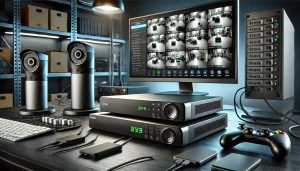
DVR vs. NVR: Which Surveillance System is Right for You?
In today’s world, security is a top priority for both homes and businesses. Choosing the right recording system for your surveillance setup is crucial to ensure the safety of your property. Two popular options are DVR (Digital Video Recorder) and NVR (Network Video Recorder) systems. While they serve the same purpose—recording video from security cameras—they operate differently and have unique advantages. Let’s dive into the details to help you make an informed choice.
What is a DVR?
A DVR system works with analog security cameras, converting analog signals into digital format for storage. It’s a traditional surveillance method that remains popular due to its reliability and cost-effectiveness.
What is an NVR?
An NVR system is designed for IP (Internet Protocol) cameras, which process video data within the camera itself before sending it to the recorder. NVR systems use a network connection, offering more flexibility and advanced features.
Key Features of NVR Systems:
1. Connection Type: Uses Ethernet cables or Wi-Fi for connectivity.
2. Compatibility: Compatible with IP cameras only.
3. Video Quality: Supports high-definition resolutions, including 4K and beyond.
4. Storage: Can store footage on internal hard drives, cloud servers, or NAS devices.
5. Scalability: Easily expandable by adding more IP cameras to the network.
Conclusion
Both DVR and NVR systems have their advantages, and the right choice depends on your specific needs. DVR systems are reliable and cost-efficient, while NVR systems offer cutting-edge technology and superior scalability.
Investing in the right system ensures you’re one step closer to safeguarding your property. Evaluate your requirements, budget, and future plans to make the best decision for your security needs.
(High-resolution image included for reference.)
